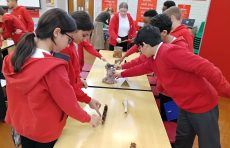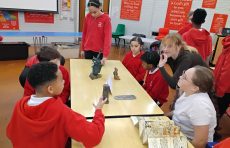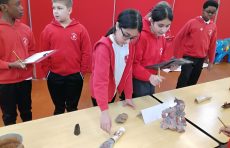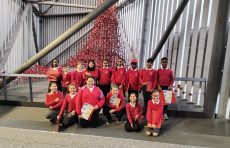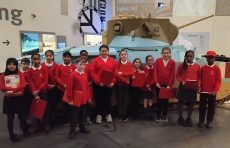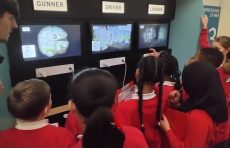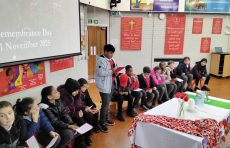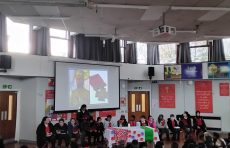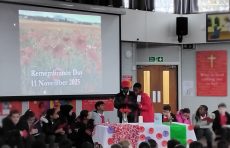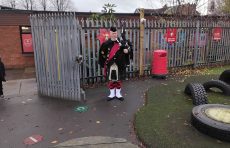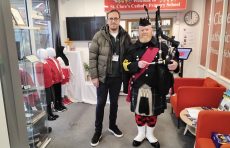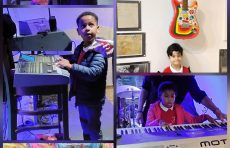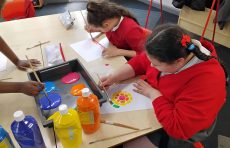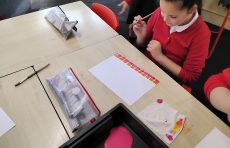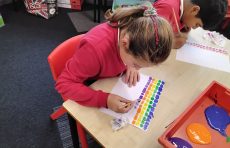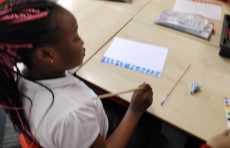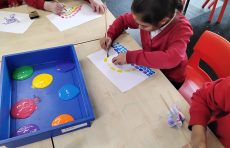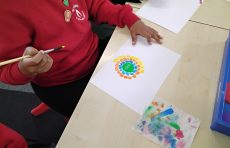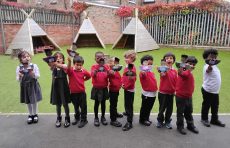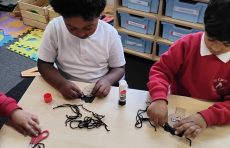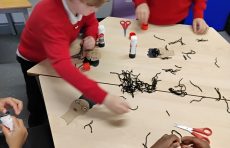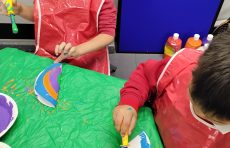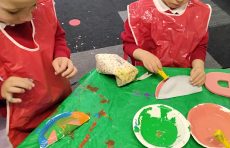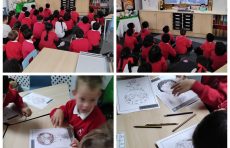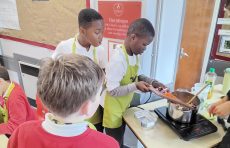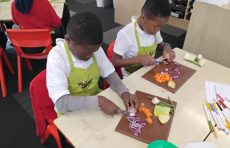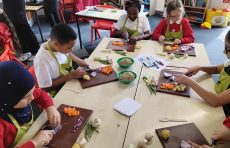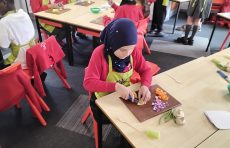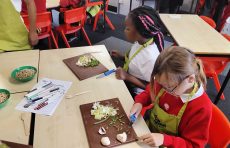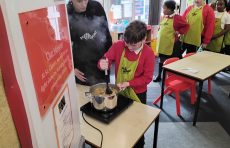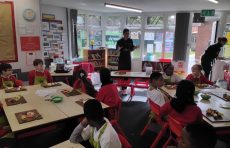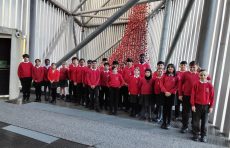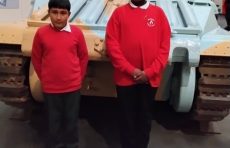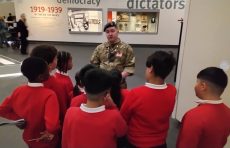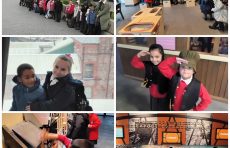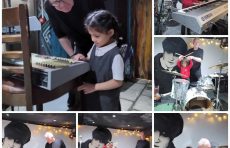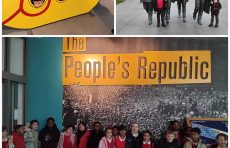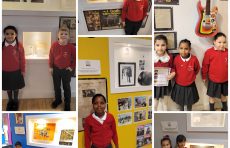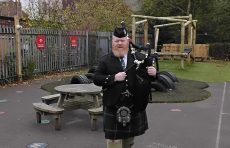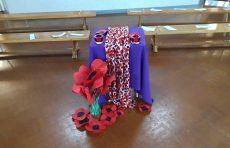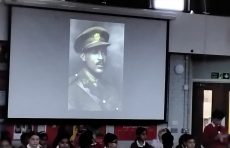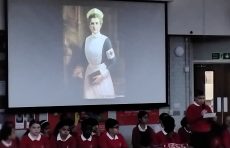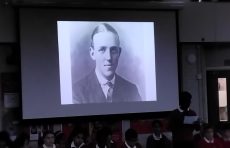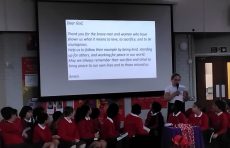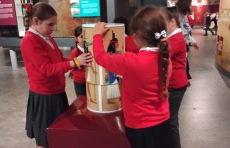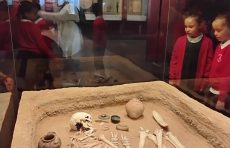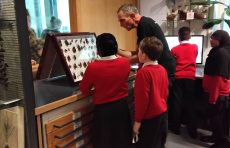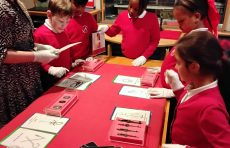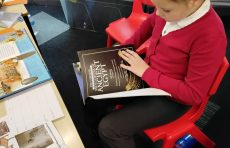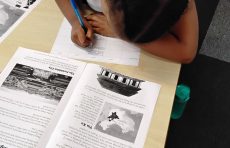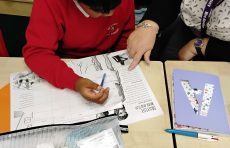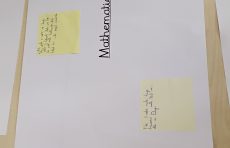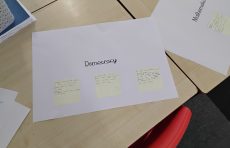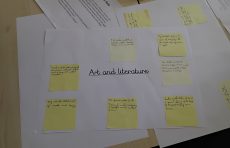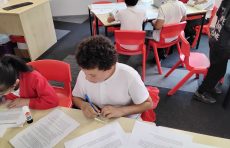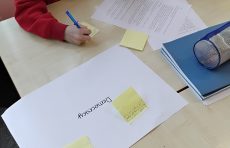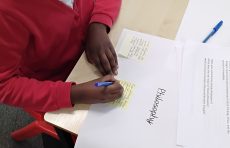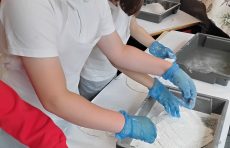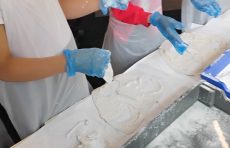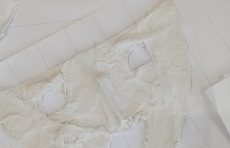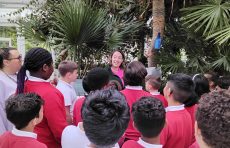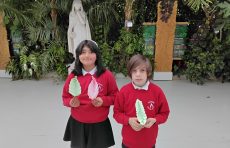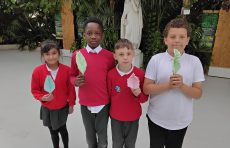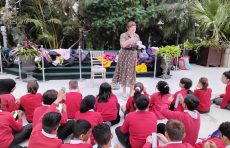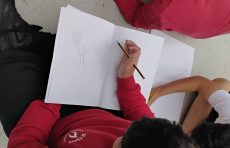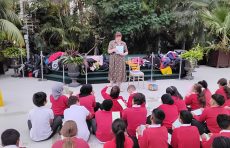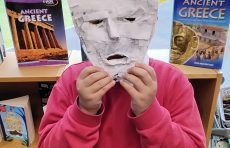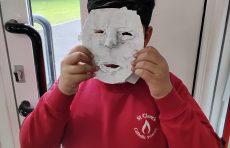“Remember the wonders he has done, his miracles, and the judgments he pronounced.”
1 Chronicles 16:12
Our history curriculum emphasises the importance of remembering and learning from the past. By studying history, we gain a deeper appreciation for God’s work throughout time and better understand our place in the world.
Catholic Social Teaching is integral to our whole curriculum. Here are some examples of where this can be seen in History:
At St. Clare’s we believe that the teaching of history provides many opportunities to teach children about the importance of peace and how to be peacemakers.
Dignity of the Human Person – That in learning about man’s accomplishments across history, children become more aware of the dignity of the individual, the potential of mankind and the importance of participation (Significant individuals – Rosa Parks Y1 and Y2 Amelia Earhart)
Solidarity and the Common Good – solidarity is built through history by learning about the lives and experiences of peoples living in the past and in different parts of the world. We also believe that common good is built by knowing ourselves and where we come from alongside knowing about the past of others. In this way, we can better appreciate the perspectives others may have. We believe that by learning to critically analyse sources for bias and provenance, students acquire skills to look at any document critically and in a considered manner.
The Option for the Poor and Vulnerable It is important that pupils recognise how people have lived and supported one another through periods of history. In Year 2, pupils learn about the Titanic and the difference it made to their survival based on which social class they belonged to. It is also discussed how it is now law to provide every human person on a ship with a life aid regardless of their wealth. Pupils in Year 4 learn about Victorian Liverpool and the poor and wealthy people who lived during this era.
Rights and Responsibilities – In Year 6, pupils learn about World War Two and Hitler’s rise to, and subsequent dictatorship over Germany and other parts of conquered Europe. Pupils learn about the rights of human beings and how people were denied these rights by not living under a dictatorship.
Intent
At St Clare’s, we are all historians!
Our intent is to ignite a passion for History; to equip our children with the knowledge, skills and understanding to become the next generation of historians! We encourage children to be curious and excited to learn about Britain’s past and that of the wider world and understand that History could also shape their future. A high-quality History curriculum encompasses topics which aim to foster awe and wonder and drive children to ask questions linked to the period they are studying. Through our teaching of History, we aim to equip children with both the tools and confidence to ask perceptive questions, reflect critically, challenge viewpoints and develop their own judgements based on historical evidence.
Implementation
At St Clare’s, we use discrete teaching of subject to develop historical skills and to encourage children to work as historians. We intend for our children to learn about History in an active and creative way. Our aims are to fulfil the requirements of the National Curriculum for History; providing a broad and balanced curriculum that encompasses the British Values throughout; ensuring the development of historical concepts, knowledge, and skills; and for the children to study life in the past.
The National Curriculum for History aims to ensure that all pupils:
- Know and understand the history of these islands as a coherent, chronological narrative, from the earliest times to the present day: how people’s lives have shaped this nation and how Britain has influenced and been influenced by the wider world.
- Know and understand significant aspects of the history of the wider world: the nature of ancient civilisations; the expansion and dissolution of empires; characteristic features of past non-European societies; achievements and follies of mankind.
- Gain and deploy a historically grounded understanding of abstract terms such as ‘empire’, ‘civilisation’, ‘parliament ‘and ‘peasantry’.
- Understand historical concepts such as continuity and change, cause and consequence, similarity, difference, and significance, and use them to make connections, draw contrasts, analyse trends, frame historically valid questions and create their own structured accounts, including written narratives and analyses.
- Understand the methods of historical enquiry, including how evidence is used rigorously to make historical claims, and discern how and why contrasting arguments and interpretations of the past have been constructed.
Topic areas that we undertake to ensure coverage of the National Curriculum objectives:
KS1:
Year 1:
• Changes within living memory (Old and new toys).
• Lives of significant individuals who have contributed to national and international achievements (Rosa Parks and Emily Davidson)
• Significant historical events, people and places in their own locality (Study of how Liverpool transport has changed over time).
Year 2:
• Lives of significant individuals who have contributed to national and international achievements (Amelia Earhart and Neil Armstrong).
• Events beyond living memory – The Titanic
• Significant events, people and places in their own locality / Lives of significant individuals who have contributed to national and international achievements (The Beatles).
KS2:
Year 3:
• Changes in Britain from the Stone Age to the Iron Age. (Stone Age).
• Changes in Britain from the Stone Age to the Iron Age. (Bronze Age and Iron Age).
• The Roman Empire and its effect on Britain (The Romans).
Year 4:
• The achievements of the earliest civilisations (Ancient Egypt). A study of Greek life and their achievements and their influence on the Western world (Ancient Greeks).
• A local History study – How aspects of national history are reflected in our locality (Victorian Liverpool).
• The Viking and Anglo-Saxon struggle for the kingdom of England to the time of Edward the Confessor (Vikings and Anglo-Saxons).
Year 5:
• A study of Greek life and their achievements and their influence of the western world (Ancient Greeks).
• A theme in British history that extends pupils’ chronological knowledge beyond 1066 (World War One).
• The Vikings, Anglo-Saxon and Scots struggle for the kingdom of England to the time of Edward the Confessor – Saxons and Vikings.
Year 6:
• A theme in British history that extends pupils’ chronological knowledge beyond 1066 / A local History study
(World War Two – Liverpool at War).
• A non-European society that provides contrasts with British history (Mayan Civilization).
• A local History Study – Liverpool in world War 2.
Through our carefully designed curriculum, the History topics will help children to gain an understanding of the
Complexity of people’s lives and the process of change; as well as their own identity and the challenges of their time. This will be done by using a range of resources that will bring history to life and include photographs, diaries, newspaper articles, music and handling real artifacts from the past. Excursions and visiting experts will enhance the learning experience. Teachers have identified the key knowledge and skills of each topic and consideration has been given to ensure progression across topics throughout each year group across the school. By the end of year 6, children will have a
chronological understanding of British history from the Stone Age to the present day. They are able to draw comparisons and make connections between different time periods and their own lives. Interlinked with this are studies of world history, such as the ancient civilisations of Greece and the Mayans.
Impact
The impact of our History curriculum is measured through a range of different strategies:
• Data which is produced from on-going teacher assessments
• Lesson observations
• Monitoring of History books
• Learning walks
• History Ambassadors
• Pupil voice
The ultimate impact and measure of the History curriculum at St Clare’s is to ensure that our children are equipped with historical skills, knowledge and understanding that will enable them to be ready for the curriculum at Key Stage 3 and for life as an adult in the wider world. Outcomes in History books evidence a broad and balanced history curriculum and demonstrate the children’s acquisition of identified key knowledge. We want the children to have thoroughly enjoyed learning about History, therefore encouraging them to undertake new life experiences – both immediate and in the future.
History club
At St Clare’s we have a History Club which at the moment is available to year 4 and year children. The club is called, ‘ We are Historians and it is a great way for students to explore fascinating historical events, figures, and artefacts beyond the classroom. It offers a fun and interactive way to dive into different eras, discuss key moments, and understand how the past shapes the present.
History Club topics
Henry VIII and His Six Wives
Henry VIII (1491-1547), one of England’s most famous monarchs, is known for his six marriages and his role in the English Reformation, which led to the establishment of the Church of England. Each of his wives played a significant role in English history:
- Catherine of Aragon: His first wife. Henry divorced her because she didn’t produce a male heir, leading to the split with the Catholic Church.
- Anne Boleyn: His second wife, executed on charges of treason-Mother of Queen Elizabeth I.
- Jane Seymour: Henry’s third wife, who gave birth to his only male heir, Edward VI, but died shortly after childbirth.
- Anne of Cleves: His fourth wife. Their marriage was annulled, and they remained on friendly terms.
- Catherine Howard: His fifth wife, executed.
- Catherine Parr: His sixth and final wife, who outlived Henry and helped reunite his children.
The stories of Henry’s marriages are central to understanding the shifts in religious and political power in 16th-century England.
British Monarchs
British monarchs have ruled for over a thousand years, with the monarchy evolving significantly over time. A brief look at key monarchs includes:
- William the Conqueror (1066-1087): Led the Norman invasion of England and became the first Norman king after the Battle of Hastings.
- Elizabeth I (1558-1603): Overseen the English Renaissance and defeated the Spanish Armada.
- Queen Victoria (1837-1901): Her reign marked the height of the British Empire and was known as the Victorian Era.
- Elizabeth II (1952-2022): The longest-reigning British monarch, who witnessed significant changes in the role of the monarchy and the modern world.
These monarchs help trace the story of Britain’s political, cultural, and social development.
Joan of Arc
Joan of Arc (1412-1431) was a peasant girl who became a French national heroine and saint. During the Hundred Years’ War between France and England, she claimed to have received visions from saints instructing her to support Charles VII and help reclaim France from English control. Joan led several successful military campaigns, which boosted French morale. However, she was captured by the English, tried for heresy, and burned at the stake. Her story is one of courage, faith, and national identity.
Battle of Hastings (1066)
The Battle of Hastings took place on October 14, 1066, and was a pivotal moment in English history. It was fought between the Anglo-Saxon King Harold II and William, Duke of Normandy (later known as William the Conqueror). William’s victory marked the end of Anglo-Saxon rule and the beginning of Norman control of England. This battle significantly shaped the English language, culture, and governance, blending Anglo-Saxon and Norman traditions.
The Bayeux Tapestry
The Bayeux Tapestry is a unique piece of medieval art that tells the story of the Norman Conquest of England, particularly the events leading up to and including the Battle of Hastings. The tapestry is nearly 70 meters long and features detailed embroidered scenes of William the Conqueror’s preparations, the invasion of England, and the decisive battle. It is an invaluable historical artifact that gives us insight into both the political propaganda of the time and everyday life in the 11th century.
The above topics are explored through various engaging activities:
- Reenactments or role-playing: For example, students could act out key moments from Henry VIII’s reign or the Battle of Hastings.
- Debates and discussions: Discuss the moral dilemmas of Henry VIII’s actions, Joan of Arc’s trial, or the significance of different monarchs.
- Interactive presentations: Students could create presentations on the Bayeux Tapestry, explaining its symbolism and historical importance.
- Quizzes and games: Fun challenges on the lives of British monarchs, key battles, or historical artifacts like the Bayeux Tapestry.
By exploring these events and figures, students in the School History Club would gain a deeper understanding of how history is not just a series of dates and facts, but a rich tapestry of human experiences that continue to impact the present.
Key Subject Documents
Fun/useful links….
